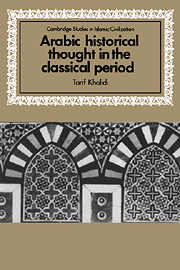2 - History and Hadith
Published online by Cambridge University Press: 23 November 2009
Summary
It was under the general rubric of Hadith that the basic religious sciences of Islam, including historical writing, were to develop. In Europe, sustained academic study of Hadith began in the middle of the nineteenth century. In the Muslim world, the study of Hadith has been continuous and, in the last fifty years or so, has begun to take stock of western scholarship on the subject. Its origins, mode of transmission and authenticity have all absorbed a long tradition of commentary. The critical examination of these three aspects of Hadith carries us into the heart of one of the most intricate problems that a historian can face in connection with a textual source. The Hadith for one thing is vast. Its apparent simplicity of structure is deceptive. It has its own ancient critical apparatus in the form of the chain of transmitters (isnad) of each individual hadith and its own technical vocabulary of transmission (tahammul al-'ilm). Almost from its inception, the Hadith literature has carried within itself its own ‘antibodies’: a streak of scepticism regarding its validity and authenticity as well as many hadiths which flatly contradict one another, to the point where many Islamic reformers or leaders have advocated its partial or complete abandonment as a pillar of the Shari'a, the Islamic law of life. Moreover, and within the last half century or so, a lot of early Hadith texts have come to light, often necessitating modification or rejection of existing theories or views.
- Type
- Chapter
- Information
- Arabic Historical Thought in the Classical Period , pp. 17 - 82Publisher: Cambridge University PressPrint publication year: 1994



